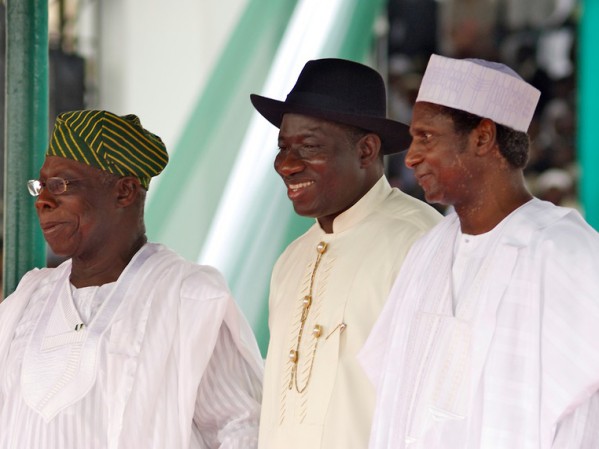A report by the Senate has accused the governments of former Presidents Olusegun Obasanjo and late Umaru Yar’adua and President Goodluck Jonathan of misappropriating N1.04trillion.
According to the Senate Committee on Public Accounts, N1.518 trillion had been voted into the Special Funds Accounts (SFA) between 2002 and 2012, of which N1.043trillion was found to have been abused.
It indicted the governments in the period under review and also blamed itself for not carrying out its oversight functions in respect of the funds.
Senator Ahmed Lawan (ANPP- Yobe) who presented the report on the floor of the Senate on Tuesday said several approvals of funds from the SFA during the period did not conform to the purposes for which the funds were established.
The SFA was established in 2002 as an interventionist fund for the development of the solid minerals sector, ecology and other critical areas of the economy.
The Accounts, which are managed by the Federal Government, comprises the three per cent Development of Natural Resources Account, 1.46 per cent Derivation and Ecology Account, and 0.72 per cent Stabilisation Account.
Those deductions came from the federation account, said the report.
According to the report, N1.51 trillion accrued to the SFA as at June 30, 2012, from figures obtained from the Office of the Accountant-General of the Federation (OAGF). Out of the amount, N1.23 trillion was recorded as total payments to beneficiaries from the account, the report said.
However, the report noted that the operation of the natural resources, ecology and stabilisation accounts were grossly abused.
It said several releases under this account were not related to the intendment of the account.
The report gave specific instances of those abuses, which included the N2 billion loan granted for payment to Gitto Construzioni General Nigeria Ltd on July 19 2005; N3,745, 505,000 loan granted to the Federal Ministry of Foreign Affairs for purchase of a Chancery in Tokyo on 25 November 2004 and N864,725,036.00 loan granted to the National Health Insurance for National ID Card production on 18 April 2005, among others.
Under the Derivation and Ecological Accounts, the report revealed abuses such as N10 million given to the Niger State government in March 2003 for building an abattoir in Bida; N800 million used for the resurfacing of the runway in Aminu Kano International Airport, Kano, in January 2003; and N750 million released for the development of Abuja Downtown Mall in January 2007 (a project which was said to be non-existent).
In the Stabilisation Account, where 75 per cent of abuse was recorded, a N12 billion loan was granted to Ghana and Sao Tome & Principe on 22 September, 2004 and 7 May 2007; N142.6 million given to Gong Publishing Company as loan of debt owned by local government councils and N2.8 billion loan granted to pay the Federal Government’s 50 per cent contribution to the Phase 1 of the Pioneer Car Finance Scheme for public servants in para-military agencies on 22 May, 2007.
The senators who were angered unanimously condemned what they described as executive recklessness displayed in the management of the funds over the years by the successive administrations involved.
In his remarks, Senate President David Mark, said the National Assembly should be blamed for the gross mismanagement of the funds for the past 11 years, as there was no legislative guideline for the executive in that respect.
He said, “These three accounts under review are not bad to be managed by the executive in any way, but the problem is the discretionary template upon which they have been disbursed, leading to one abuse or the other.
“It is totally an indictment of the National Assembly. It is a wake-up call on us to look into how these funds are managed through legislative guidelines.”
In his reaction, Chairman of the Federal Capital Territory (FCT) Committee, Smart Adeyemi, said, “When government doesn’t spend funds for purposes of helping the public, it can be described as rascality of the executive.”
He wondered why the government continued to grant loans to governments that have enough as it encourages them to misappropriate public funds, and called for proper investigation of the Lawan Report to ascertain the extent of misappropriation of public funds.
The Senate Deputy Majority Leader, Senator Abdul Ningi said, “This is sheer crass executive recklessness and the National Assembly’s indifference to it. Going through the report, it is a combination of personal driven issues between those who collected loans and those who abused it.
“We must not sweep away these findings, they must be thoroughly investigated to the fullest.”
Also commenting, Senate Leader Victor Ndoma-Egba said the impunity shown in the report confirmed his earlier belief that public finances still remained opaque after 14 years of democratic governance, as they were under military rule.
“All the misapplications of funds carried out by the executive in the special funds accounts since 2002 are clear attestations of an opaque public finances in Nigeria where for now, transparency and accountability are rules not adhered to, in anyway by the executive arm of government“, he said.
The Senate has directed the committee to investigate further on the utilization and repayment of the Special Funds Accounts and report back to it within four weeks before considering the five recommendations made in the report.




 Premier League
Premier League